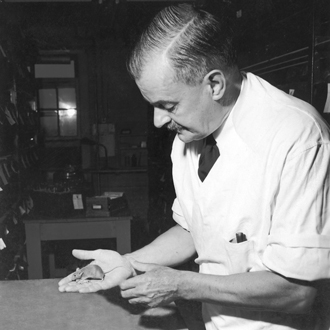
C.C. Little.
The wooden sign in front of the 1929 building that was the original JAX read, “Roscoe B. Jackson Memorial Laboratory, Research in Cancer and Genetics.”
“C.C. Little founded The Jackson Laboratory on the then-bold idea of investigating the genetic basis of cancer,” said former JAX President and CEO Rick Woychik. “Study the genetics and you learn about cancer. Little was right."
Little’s own father, James Lovell Little, Jr., had died of cancer in 1914. It’s hard to imagine how terrifying a diagnosis of cancer would have been at the beginning of the 20th century. Available treatment options of surgical removal and radiation did little to extend a patient’s life; prevention was impossible because the causes of cancer had not been scientifically established. Cancer seemed to be more common in some families, which fed the centuries-old speculation that it was an infectious disease. (Nature provides exceptions to most rules; genuinely transmissible cancers have been found in dogs, shellfish and Tasmanian devils.)
It was Little’s pursuit of cancer genetics through genetically defined laboratory mice that would lay the groundwork for nine decades of advances in cancer diagnosis and treatment. Little’s genetics-mouse combination would become the key to exploring all human disease, as well as normal mammalian development and aging. “Cancer was the driving force that carried mouse genetics through its first five decades and greatly influenced the development of the mouse as a genetic system,” said Woychik’s successor as JAX director, Ken Paigen. “The pressure to solve an important medical problem resulted in a new experimental system with far wider application in the years to come.”
Accordingly, as the JAX faculty has grown from the original eight to 75 scientists from diverse backgrounds and areas of expertise, the scope of research has also expanded dramatically. Today JAX researchers advance mammalian genetics and human genomics research in virtually every aspect of human biology and disease.